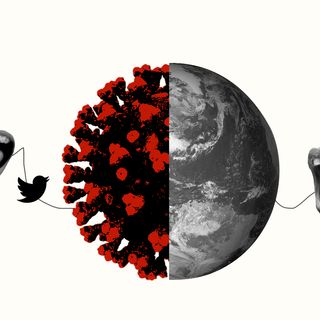Most recently, a U.K. sexual health charity released guidelines answering a question that has pervaded people’s minds since the coronavirus pandemic began: can we have sex? Functioning on the premise that it is no longer realistic to expect people to refrain from having sex — after many, many months of lockdown and frustrating isolation — the Terrence Higgins Trust delineated ways in which people who do succumb to their needs can manage the infection risk. While masturbation, phone, and video sex remain the optimal, lowest-risk ways to have sex, the charity advises people to limit their number of sexual partners. Potential IRL sexual partners need to discuss if they’ve felt sick, or have come into contact with anyone who they think were sick before embarking on any intimacy. The charity advises washing hands vigorously for 20 seconds before and after sex, not kissing, not engaging in any face-to-face sex positions, and wearing a mask at all times during intercourse.
These guidelines are a departure from the strict, every-couple-for-themselves stance the UK government took earlier in the pandemic, essentially asking couples to make a choice — either live together, or stay away from each other and “test the strength of their relationship.” As lockdowns progressed around the world and couples’ break-up stories started dominating headlines, we now know that was probably bad advice.
Related on The Swaddle:
We’re All Deprived of Touch Under Lockdown. It Can Affect Our Self-Perception.
Elsewhere in Europe, government officials were more than happy to encourage the population to engage in intercourse. Back in April, Denmark’s health chief had said, “Sex is good. Sex is healthy. We are sexual beings, and of course you can have sex in this situation … As with any other human contact, there is a risk of infection. But of course one must be able to have sex.” The country has discouraged large gatherings but has since maintained that the Danish have an absolute, inalienable right to have sex under lockdown. Close by in the Netherlands, government officials encouraged singles living alone to find “sex buddies,” later clarifying their stance to mean people who were already in relationships or knew each other, but were living in separate houses.
In the U.S., on the other hand, multiple states and cities have stressed having “safe sex” with your own self, and severely discouraged people from meeting up with sexual partners they don’t live with. The state of Oregon, however, is an exception — it has encouraged selective kissing (limited to close circles) and gone down a more comprehensive sex education route than resorting to recommend abstinence. In one graphic, officials explained how rimming or analingus (orally stimulating the anus) was not a good idea during the coronavirus pandemic, seeing how Covid19 can exist in feces.
In these times, the term “safe sex” has taken on a completely different meaning. It’s not just about protection from unwanted pregnancy or STDs, but also from a deadly infectious virus. To that end, logically speaking, no amount of safety measures can completely guarantee a person risk-free sex, especially if done with people they haven’t already been isolating with. Something as simple as kissing can lead to a Covid19 infection, owing to the exchange of saliva that we know can be a vector for transmission of the novel coronavirus. At the end of the day, it all boils down to personal choice, hopefully informed by in-depth communication with a potential sexual partner about their health, where they’ve been and who they’ve been in contact with.
For us, these guidelines from around the world will simply have to do, because of course, the Indian government has been quite silent about it all. If Covid19 sex guidelines could tell us about cultures around the world, what would they say about ours?




